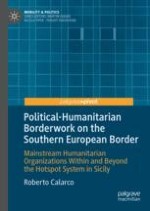This book focuses on the role mainstream humanitarian organizations have in the functioning of the border management system on the southern European border (i.e. Italy). In particular, the author analyses the mainstream humanitarian organizations and NGOs (i.e. Red Cross, the UNHCR, Medici per I Diritti Umani – MEDU, Terre des Hommes and Oxfam) and their role within and beyond the implementation of the so-called ‘hotspot approach’ in Sicily. This work suggests that a vision of humanitarian action as just anti-political and complicit with migration control can be questioned. This book suggests that a) mainstream organizations have been able to politicize their positioning and actions vis-à-vis authorities when migration policies have been tightened; b) mainstream organizations’ political borderwork has helped to promote incremental change in the status quo rather than a radical one. Finally, this book suggests that the discourses and practices of mainstream and grassroots actors seems to be characterized by similar contradictions.
